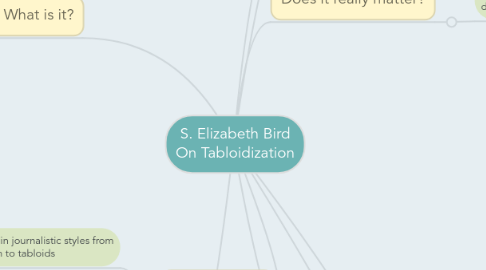
1. The shift is characterised by shifts in style of writing and the content produced
2. The tabloid: What is it?
2.1. Tabloid media may take various stylistic forms and cover a variety of topics, depending on the context and cultural specificities of where they are produced
2.2. Generally understood in terms of style and content, often characterised by formulaic, colourful and sensationalist narratives often focusing on aspects of human interest.
2.2.1. "Entertainingly sensational, written in the idioms of the people"-- Bird citing William Randolph Hearst on the emergence of tabloid media in Britain during the 1920's
2.3. Generally criticised for their appeal to base instincts and sensationalism, coupled with a lack of lack of journalistic integrity and objectiveness-- hallmarks of apparently "good" journalism
3. Tabloidization
3.1. Refers to the shift in journalistic styles from "good" journalism to tabloids
3.2. Lament for the shift began with the popularisation of news and cheapening of public discourse that critics assign to the emergence of the "penny press"
3.2.1. The penny press was a popular new format of journalism emerging in the 1830's, whose writers produced dramatic, human interest news often involving crime and mayhem
4. The shift in content
4.1. Increasing trivialisation
4.2. Entertainment news
4.2.1. Celebrities
4.2.2. Gossip columns
4.2.3. Often accompanied by images, notably unflattering photos
4.3. Political coverage
4.3.1. Takes on the appearance of horse racing commentary
5. Personalisation and accessibility
6. Does it really matter?
6.1. Tabloid media does not necessarily entail a decline in standards
6.1.1. Mexico: as elite controls on news have weakened, tabloidization has been a positive force for social and democratic change
6.1.2. In many eastern nations, tabloidization has meant a more open and accessible media
7. The shift in styles
7.1. From lengthier, complex analysis
7.2. To shorter, punchier sentences, often in narrative form
7.3. Emphasis on the personal
7.3.1. News stories told through with emphasis on the way people react or cope with a given situation
7.4. Reliance on images
8. Information gathering and truthiness
8.1. Information gathered from:
8.1.1. Paid informants
8.1.2. Gossip-mongers
8.1.2.1. This level of objectivity is no better than the countless people able to post information online, marring the distinction between tabloid journalists and regular people
8.1.3. Rumor
9. Ultimately, it is incorrect to assign all the evils of modern day journalism to the process of tabloidization
9.1. Tabloid media isn't a particularly new phenomena, nor is its emphasis on emotionally-laden, personal stories of celebrities, human interest, and sensationalism--in fact, these can perform an important cultural role
9.2. However
9.2.1. Tabloidization detracts from the value placed upon proper journalistic pursuits and information gathering
9.2.2. It also does not take full advantage of the potential of the internet for informed discussion and audience input/criticism
